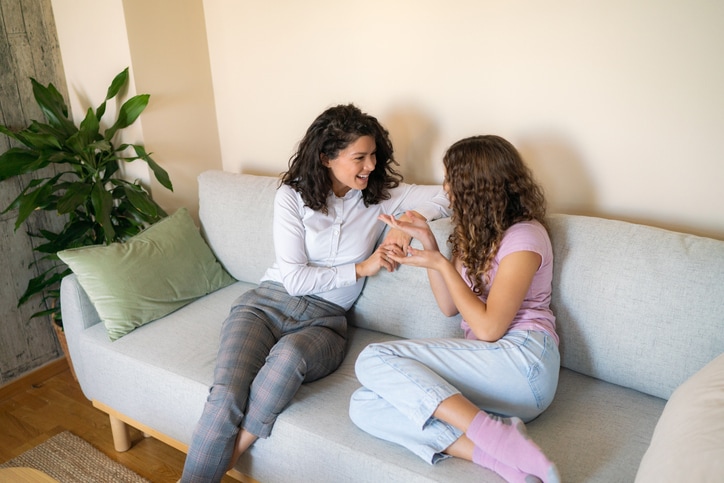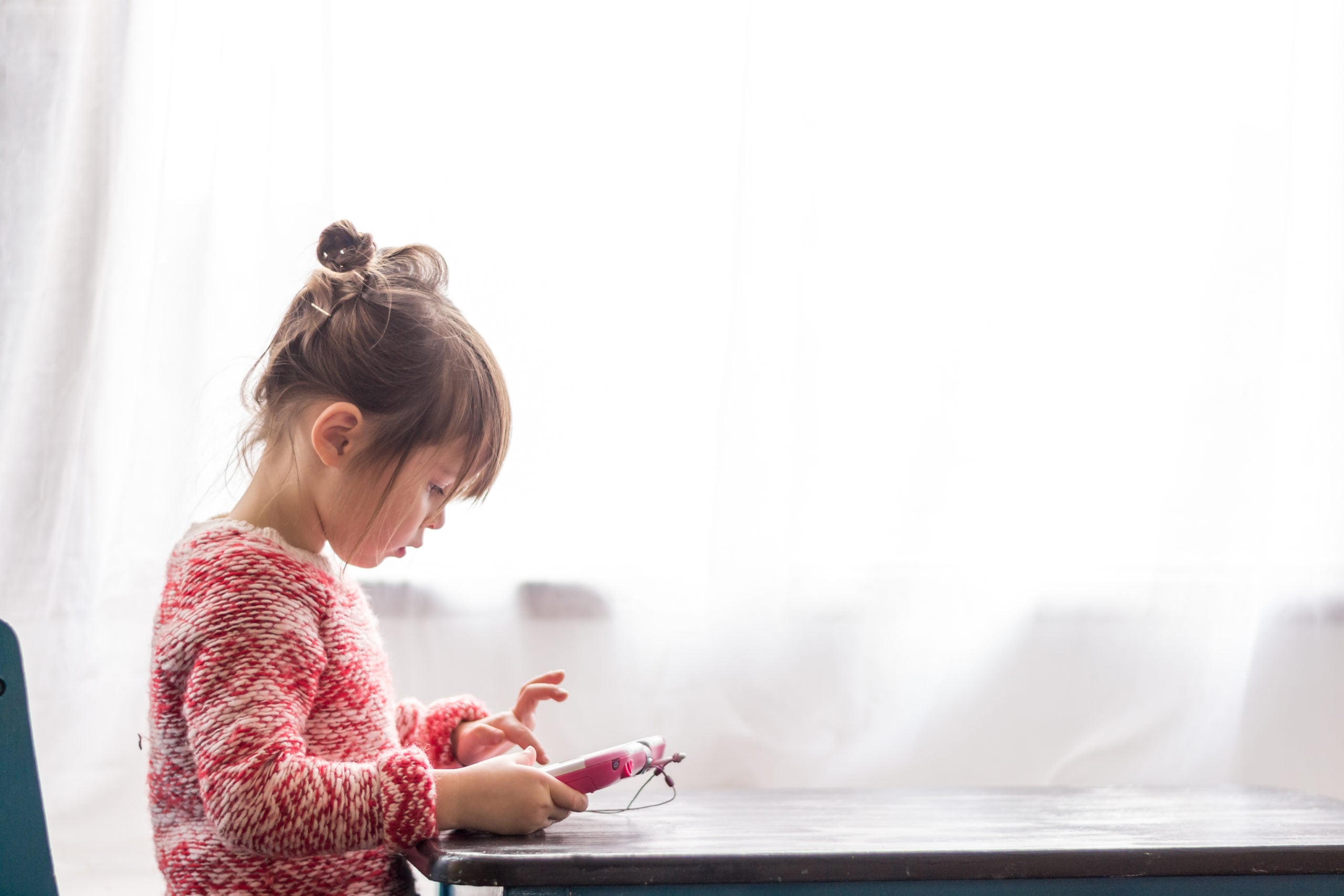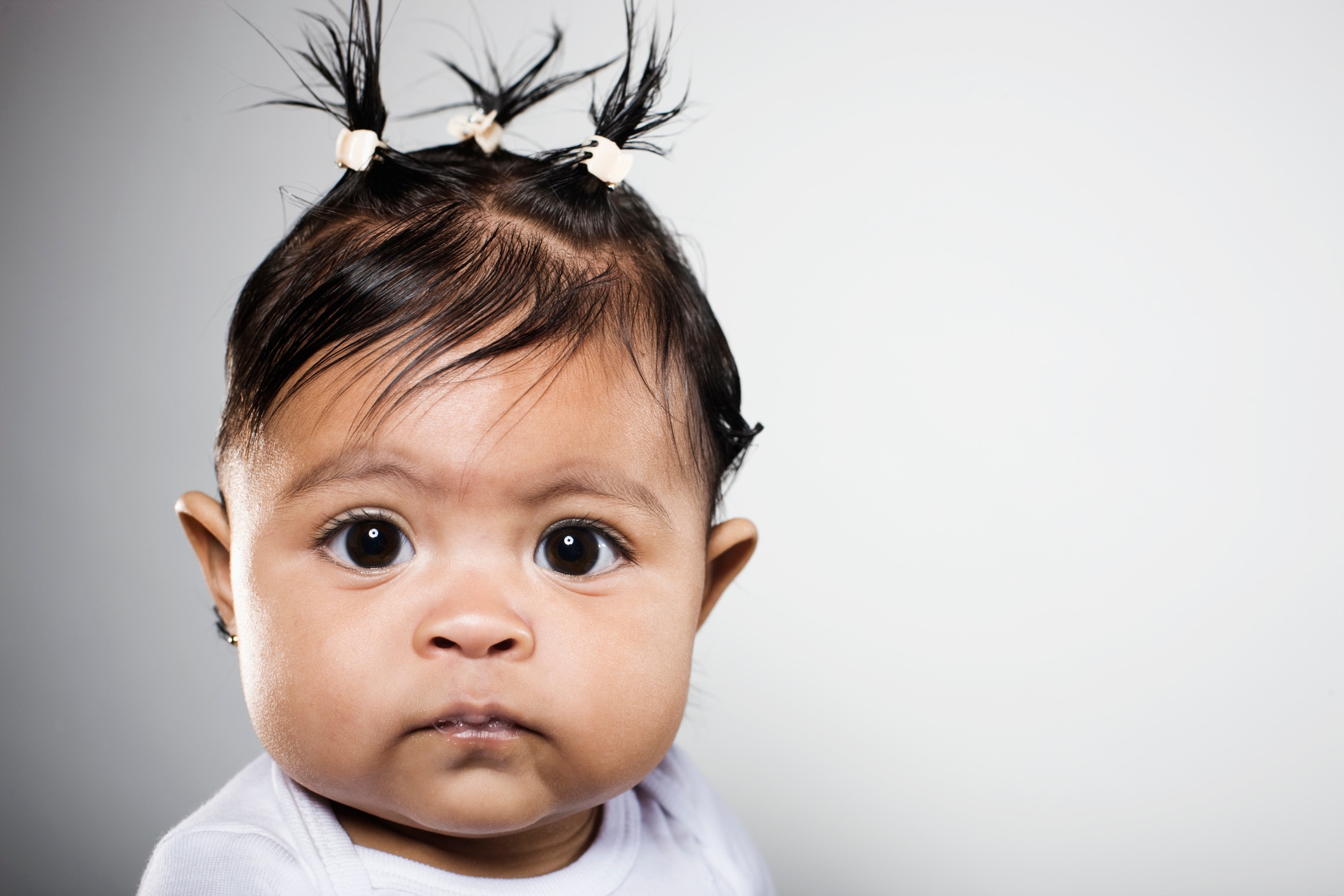If it sometimes feels like kids are speaking another language, that’s because they are. Each year, it seems, dozens of new slang words are added to the grade school lexicon, and it can be hard for parents and caregivers to keep up. You might be asking yourself, “If my kids keep calling me ‘bro,’ is that a good … or bad thing?” or “What the heck is ‘rizz’ anyway?” We’re here to help, and it turns out there are good reasons to learn the latest kids slang.
“Learning to speak your kids’ digital language in all its forms — including slang and emoji speak — is one of the best ways to stay up to speed with what your kids are doing online and, more importantly, who they’re communicating with,” says Titania Jordan, chief parenting officer for Bark Technologies and author of “Parenting in a Tech World.“
So, what are the cool slang words right now, and what do they actually mean? We asked parents, teachers and, most importantly, kids to fill us in. Here’s the kids slang you need to know to communicate in 2024.
18 popular kids slang words
1. Bruh (or bro)
What it means: Most adults recognize “bruh” and “bro” as shortened forms of the word “brother” that have been around for decades (actually, since the 1800s, according to Merriam-Webster). In 2024, the constant use of “bruh” by the tween set has reached epidemic levels — so much so that TODAY wrote an explainer on why your kid keeps calling you “bruh.”
How it’s used: “Bruh” and “bro” can be used to address anybody, and they can be terms of endearment, expressions of annoyance, filler words, interjections — you name it.
- Bruh, that’s so cringe!
- Bro is awesome at Fortnite.
Style notes: “My 12-year-old calls everyone ‘bruh’ and says ‘bruv’ is equivalent to ‘y’all’,” says Lindsey Strachota, a parent from Omaha, Nebraska.
Join Care for free
2. Sigma
What it means: “Sigma” may have started out as a letter in the Greek alphabet, but to kids and teens it means something or someone is “the coolest,” says Rylan, a 12-year-old from North Texas. The word got its start in masculinist subculture, according to Dictionary.com, where it means “a popular, successful, but highly independent and self-reliant man.”
How it’s used: “Sigma” is typically used an adjective. You can also use it to ask someone if they are cool or feeling good.
- Yo, that’s so sigma!
- Bruh, are you sigma?
Style notes: “My kid has also been saying ‘what the sigma’ a lot,” Strachota adds. This is essentially a nonsense phrase that comes from a Spongebob Squarepants meme on TikTok.
3. Rizz
What it means: “Rizz” comes from the word “charisma,” and it essentially describes someone’s ability to be charming or flirtatious.
How it’s used: If you’re an adult, you might recall how the word “game” was used as slang in the ’90s — as in, “He’s got game.” “Rizz” is used in much the same way. It can also be used as a verb to mean flirting or hitting on someone.
- Bruh has mad rizz.
- She’s trying to rizz him up.
Style notes: There are also varying levels of rizz, according to Rylan. If you have “L rizz”, it means you are bad at flirting (think of “L” as “loser”). Alternatively, he says someone who is a winner or good with flirting has “W rizz.”
4. Skibidi
What it means: “Skibidi” means something is bad, uncool, evil or low quality. Alternatively, it can also mean something is good, according to Rylan, so it’s confusing. “There’s no real meaning,” he adds. “Skibidi” comes from Skibidi Toilet, a viral video series in which talking heads pop out of grungy toilets and sing and dance.
How it’s used: “Skibidi” is mostly used as an adjective, and it’s popular online.
- You’re so skibidi.
- He’s got that skibidi rizz.
Style notes: “Skibidi is very middle school slang,” warns Sarah Petrick, a parent from Michigan. “High schoolers despise it.”
“Skibidi is very middle school slang. High schoolers despise it.”
— Sarah Petrick, parent from Michigan
5. Mid
What it means: If something is “mid,” it means it’s “not great,” says Sarah Stockstill, a parent from Dallas. Think: middle, mid-level, medium. It’s a word for something that is average or even mediocre.
How it’s used: “Mid” is used as an adjective to describe anything from activities to objects to people.
- Bro, doing dishes is so mid.
- Everybody likes that new Ariana Grande song, but it’s so mid.
Style notes: “Mid” is used to talk about things that are moderately bad. It’s not usually used for things that are truly terrible.
6. Based
What it means: “Based” means true to one’s self or secure in one’s beliefs regardless of what others think, according to Dictionary.com. It can also mean that something is true or “based in fact.”
How it’s used: “Based” is most commonly used as an adjective or as a response that signals agreement.
- This is the most based video on TikTok.
- Tacos are the best food? Based.
Style notes: Based can also be used ironically, says Elizabeth Nye, a parent from Omaha, Nebraska. For example, someone might say or do something totally ridiculous and then a kid will respond with “based” sarcastically, such as posting “based” in the comments on a silly meme.
7. Ohio
What it means: “Saying something is ‘Ohio’ means it’s bad or the worst,” Stockstill says. The term evolved organically out of online conversations about how there doesn’t seem to be much going on in Ohio, Distractify reports. From there, a meme was born, with kids posting things that were weird or boring and describing it as “[X] in Ohio” or “Only in Ohio.” Before long, it was just shortened to “Ohio.”
How it’s used: “Ohio” is used as an adjective, not as a place.
- That’s so Ohio.
- I feel Ohio just listening to my parents trying to use slang.
Style notes: “Ohio” can be combined with other slang to form the ultimate insult, as in, “He’s got that Ohio rizz.” In kid speak, that means you’re, like, the worst at flirting.
“Saying something is ‘Ohio’ means it’s bad or the worst.”
— Sarah Stockstill, parent from Dallas
8. Gyatt (or gyat)
What it means: “Gyatt” or “gyat” is slang for, well, a big butt. Sorry, there’s no polite way to say it. According to Dictionary.com, “gyatt” evolved as an alternate online spelling of the phrase “G*d d*mn,” and it may sound new to adults, but it’s actually been in use since the early 2000s.
How it’s used: “Gyatt” is used as both a noun and as an exclamation. When used as an exclamation, it can mean someone has a voluptuous figure or just that they look good.
- Yo, that video game character has a gyatt!
- Did you see her dress at the Met Gala? Gyat!
Style notes: “Gyatt” is mostly used in reference to women. While it’s a silly term, it also might be worth having a conversation about sexism and objectification if this becomes a regular phrase in the house.
9. Sus (or suss)
What it means: “Sus” is short for “suspicious” or “suspect.” It was popularized among kids by the video game “Among Us,” though Merriam-Webster notes the term has been used as slang in English since at least 1955. Kids often use it to describe things that are odd, shady or just seem weird.
How it’s used: “Sus” is used as an adjective in basically the same way that you might use its longer forms.
- Bro, that photo looks sus. I think it’s A.I.
- It’s pretty sus how she keeps deleting comments on TikTok.
Style notes: Occasionally, “sussy” is used in place of “sus,” but it means the same thing.
10. Ate
What it means: “Ate” is a form of praise. If you “ate,” it means you did something well. If someone does something exceptionally well or looks extremely good, then you can say they “ate and left no crumbs,” adds Toni C., an elementary school teacher in Dallas.
How it’s used:
- Did you hear that new Sabrina Carpenter song? Oh, she ate!
- I saw Beyonce in concert. She ate and left no crumbs.
Style notes: “Ate” is only ever used in the past tense form in slang. You wouldn’t say, “Oh, she’s eating.” That would be very Ohio of you.
11. Bussin
What it means: “Bussin” means “really good,” according to Rylan. Merriam-Webster adds that bussin can also be used to mean something is tasty or delicious.
How it’s used: “Bussin” is an adjective used to either compliment someone or describe something that’s really awesome.
- You look bussin.
- Did you try the new burger place? The food is bussin.
Style notes: If you feel like you’ve been hearing “bussin” nonstop, you’re probably right. The language platform Preply reports “bussin” was the seventh most commonly used slang term among kids in 2023.
12. Cook, cooked and cooking
What it means: Kids have adopted various forms of “cook” and “cooking” to mean different things. First, you have “let them cook,” which according to Petrick means “don’t judge or don’t interfere.” Then, there’s “cooked,” which Logan, a 15-year-old from Steamboat Springs, Colorado, says means “you’re not doing great.” Alternatively, if you are doing well, Logan says, “You’re cooking. Or, if you will do great [in the future], you’re gonna cook.”
How it’s used: “Cook” is a verb to describe either doing something well, doing it terribly or being in the process of attempting to do something.
- Why do they keep benching Kelce at the Super Bowl? Let him cook!
- Dude, your show is on Friday? You’re gonna cook!
- I failed the test. I’m cooked!
Style notes: The phrase “let him cook” has a specific origin, according to Dictionary.com. It’s attributed to rapper Lil B, who has used it on social media since at least 2010.
13. Your [noun] is [verbing]
What it means: “My 13-year-old is constantly saying stuff like, ‘Your lashes are lashing,'” says Stephanie Barone Jankowski, a parent from Pittsburgh. It’s a compliment, she adds, basically saying that whatever is being complimented is living up to its full potential.
How it’s used: Take whatever noun you want to compliment, then add -ing to the end.
- OMG, your ‘fit is fitting.
- The hair is hairing, OK?
Style notes: This likely evolved from use of the slang term “mother,” a word taken from the LGBTQ+ community that means “icon” or “legend.” People often say “Mother is mothering” to describe someone who is doing something iconic. This seems to follow the same format.
14. Preppy
What it means: “Preppy” has been around for decades, but kids these days use it a little differently. Petrick reports that her kids use “preppy” to mean “cute.” Dictionary.com defines “preppy” as style that is “bright, colorful and usually pink.” It describes trendsetters and influencers, and it can also include expensive skincare and hygiene products.
How it’s used: “Preppy” is an adjective, and it’s not an insult like it used to be in the ’80s and ’90s.
- She has such a preppy aesthetic.
- Omg, it’s so preppy. I love it!
Style notes: This word seems to be gaining major popularity in 2024, particularly among the tween set. “My daughter’s middle school friend says everything is preppy,” Nye says.
15. -core
What it means: Aesthetics, or specific styles of clothing and decor, are very trendy right now, and attaching the suffix “-core” to almost any word can transform it into a name for an aesthetic. For example, “cottagecore” is an aesthetic focused on vintage, handcrafted and cutesy items.
How it’s used: Add “-core” to almost any descriptor to denote an aesthetic and/or obsession with a specific cultural trend.
- We’re going to dress in full Barbiecore and watch the “Barbie’ movie.
- OMG, I love your outfit. It’s so fairycore.
Style notes: Toni notes that “aesthetic” itself is a growing trend in kid and teen slang, even without referencing a specific “-core.” For kids, saying something is “aesthetic” means it “looks good,” she explains.
16. Mew
What it means: “Mewing is an action,” notes Amber O., a school teacher in Fort Worth, Texas. Specifically, when kids “mew” they press their tongue to the roof of their mouth and suck in their cheeks, giving them the appearance of a chiseled, muscular face. Then, they hold their finger up to their mouth in a “shush” motion and stroke their cheek.
How it’s used: “When somebody comes up and asks you a question — particularly if it’s the teacher or a parent — and you don’t want to answer the question, you hit them with the (mewing),” says Phillip Lindsay, a special education teacher who decodes kid and teen slang, in a TikTok video.
Style notes: Mewing is not a serious gesture. Kids use it as a joke. Urban Dictionary also notes that mewing is a part of “looksmaxxing”, or using specific gestures to improve one’s physical appearance, but the way kids use it to be funny has mostly moved away from that intent.
17. Touch grass
What it means: If a kid tells you to “touch grass,” it means you’re chronically online and/or acting ridiculous and you need to take a break, go outside and get back in touch with reality.
How it’s used: “Touch grass” is a command, and it’s used most often in comment sections on social media or as a response to posts on Reddit, TikTok, Discord and other sites.
- If you’re mad about a meme, you need to touch grass.
- Bro needs to get off TikTok and touch grass.
Style notes: “Touch grass” isn’t strictly literal. It doesn’t mean you actually have to go outside; it’s just a call to step away and get some perspective.
18. Cringe
What it means: “Cringe” is a quicker way of saying something is “cringey” or “cringeworthy.” Basically, it means awkward, embarrassing or cheesy.
How it’s used: In slang, “cringe” is an adjective, not a verb. It is something you feel and experience, not something you literally do.
- Mom, don’t try to use slang. It’s cringe.
- OMG that song is so cringe.
Style notes: “Cringe” can be combined with other words to describe specific subgroupings of cringey behavior, such as “millennial cringe,” a phrase circulating on TikTok that describes things Millennial parents (and other adults) do that kids see as outdated and embarrassing.
The bottom line
Slang is constantly evolving, and the words kids are saying today probably won’t be cool two years from now. But as language changes, it’s important for parents and caregivers to stay up-do-date, not only to avoid being “cringe”, but also so they can help kids make good choices around the language they use.
A lot of slang comes from African American Vernacular English and/or the LGBTQ+ community. Words like “gyatt” and “bussin” originated in Black communities online or among hip-hop artists and their fans. There has been serious debate about whether widespread use of certain slang words can be considered a form of cultural appropriation — and that’s a topic worth learning about and discussing with the young people in your life.
Most importantly, adds Jordan, knowing the latest slang can help you keep kids safe in their interactions, both with friends and in the larger world online. She concludes, “The more you know, the better equipped you’ll be to have healthy conversations about making smart choices online and staying safe.”





